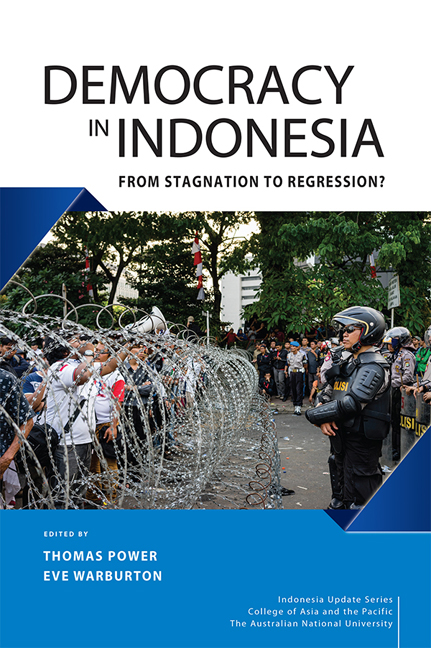Book contents
- Frontmatter
- Contents
- Tables and Figures
- Contributors
- Foreword
- Acknowledgments
- Glossary
- 1 The decline of Indonesian Democracy
- Part 1 Historic al and Comparative Perspectives
- Part 2 Polarisation and Populism
- Part 3 Popular Supp ort for Democracy
- Part 4 Democratic Institutions
- Part 5 Law, Security and Disorder
- Index
- Indonesia Update Series
6 - Is populism a threat to Indonesian democracy?
Published online by Cambridge University Press: 24 November 2020
- Frontmatter
- Contents
- Tables and Figures
- Contributors
- Foreword
- Acknowledgments
- Glossary
- 1 The decline of Indonesian Democracy
- Part 1 Historic al and Comparative Perspectives
- Part 2 Polarisation and Populism
- Part 3 Popular Supp ort for Democracy
- Part 4 Democratic Institutions
- Part 5 Law, Security and Disorder
- Index
- Indonesia Update Series
Summary
Populism looms large as a contributing factor in the global democratic recession. The hazards to liberal democracy posed by populism, which I define here as ‘a political strategy [emphasis added] through which a personalistic leader seeks or exercises government power based on direct, unmediated, uninstitutionalized support from large numbers of mostly unorganized followers’ (Weyland 2001: 14), are manifold. Foremost among the concerns is what might, for simplicity's sake, be referred to as the process of ‘populist autocratisation’. In this scenario, a political outsider is elected as head of government on an anti-establishment platform and falls into conflict with old elites and the institutions they control. Thereafter, the new leader moves to erode horizontal checks on presidential power, buoyed by the support of ‘the people’ in whose name they claim to govern (Levitsky and Loxton 2013). Evidence from Latin America shows that populist rule, on average, serves to lower countries’ quality-of-democracy scores (Huber and Schimpf 2016) and is particularly associated with the erosion of checks on executive power (Houle and Kenny 2018) and attacks on press freedom and freedom of expression (Kenny 2019a). Similar studies using global databases have found that populist rule is correlated with the erosion of civil liberties and checks and balances (Kyle and Mounk 2018).
With this global context in mind, scholars have long speculated that Indonesia was ‘structurally vulnerable’ (Slater 2014: 312) to a populist reaction to the manifest failings of the post–New Order democracy. So prominent were some of the social and institutional correlates of populism in the Indonesian case that, by the end of the presidency of Susilo Bambang Yudhoyono (2004–14), the emergence of a populist threat to democracy was ‘almost over-determined’ (Aspinall 2015: 3). Now, midway through the tenure of President Joko Widodo (Jokowi)—who emerged not only as a populist, but also as an outsider to the national political elite—it is worth reassessing what role, if any, populism is playing in the democratic regression that is the subject of this volume.
In this chapter, I first emphasise how, in spite of the ample ‘raw material’ for populism found in the post-Suharto political system, key features of Indonesia's institutional framework have put barriers in the way of individuals and groups seeking to launch populist parties, movements and candidacies.
- Type
- Chapter
- Information
- Democracy in IndonesiaFrom Stagnation to Regression?, pp. 101 - 117Publisher: ISEAS–Yusof Ishak InstitutePrint publication year: 2020

